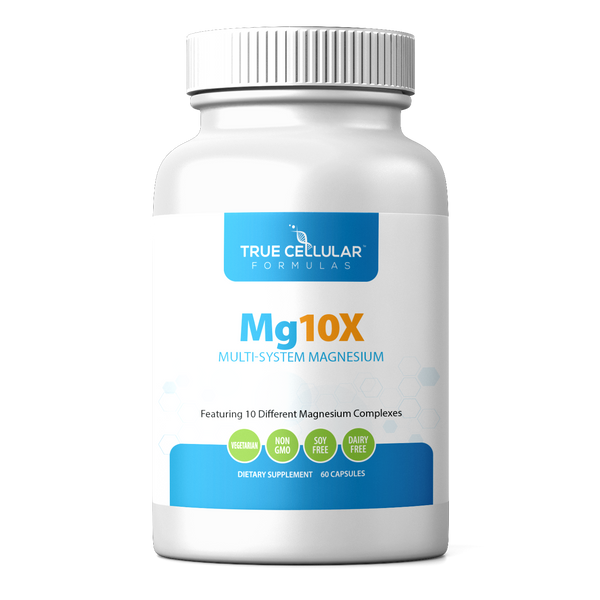
Unlocking the Potential: Magnesium's Crucial Role in Cardiovascular Health
Share
The human heart is central to life's rhythm and is at the core of our well-being. Ensuring its optimal function is imperative for overall health. Amidst the array of nutrients essential for cardiovascular health, magnesium stands out as a silent yet potent player. Magnesium quietly supports various biochemical processes critical for heart health, often overshadowed by its more illustrious counterparts like calcium and potassium.
Understanding Magnesium's Impact
Magnesium, a mineral in the body, is involved in over 300 enzymatic reactions, many of which are pivotal for cardiovascular function. One of its primary roles in regulating muscle contraction, including the heart muscle.[1] Magnesium facilitates the relaxation phase of the cardiac muscle after each heartbeat, which is crucial for maintaining a regular rhythm and preventing arrhythmias. Additionally, magnesium helps to dilate blood vessels, promoting proper blood flow and reducing hypertension, a significant risk factor for heart disease.[2]
Furthermore, magnesium plays a role in maintaining the integrity of the cell membrane, which is essential for the proper functioning of cardiac cells. It also aids in the metabolism of nutrients, including glucose and fats, contributing to overall energy production within the heart muscle.[3]
The Link Between Magnesium Deficiency and Cardiovascular Disease
Magnesium, often regarded as the unsung hero in cardiovascular health, plays a multifaceted role in maintaining the proper function of the heart. At the core of its significance lies its pivotal role in regulating muscle contraction, particularly within the cardiac muscle. Magnesium acts as a natural calcium channel blocker, facilitating the heart's relaxation phase after each contraction. This rhythmic interplay between contraction and relaxation is fundamental to maintaining a regular heartbeat and preventing arrhythmias.[4]
Beyond its role in muscle function, magnesium influences cardiovascular health through its vasodilatory effects. By relaxing the smooth muscle cells lining blood vessels, magnesium promotes vasodilation, reducing peripheral resistance and facilitating blood flow. This vasodilatory action helps regulate blood pressure, a critical factor in preventing hypertension, atherosclerosis, and other cardiovascular diseases.[5]
Moreover, magnesium is intricately involved in maintaining the structural integrity of cardiac cells. It serves as a cofactor for enzymes involved in energy metabolism within the heart, facilitating the production of adenosine triphosphate (ATP), the primary energy currency of cells. Adequate magnesium levels are essential for sustaining the energy demands of the heart, especially during periods of increased workload or stress.
Despite its paramount importance, magnesium deficiency is prevalent in modern society, with many individuals failing to meet their daily requirements through diet alone. Poor dietary choices, characterized by consuming processed and refined foods, contribute to inadequate magnesium intake. Additionally, lifestyle factors such as excessive alcohol consumption and certain medical conditions, including gastrointestinal disorders and diabetes, can impair magnesium absorption and increase urinary excretion.
Furthermore, certain medications, such as diuretics and proton pump inhibitors, can further deplete magnesium levels in the body. This pervasive deficiency has significant implications for cardiovascular health, as numerous studies have linked low magnesium levels to an increased risk of cardiovascular diseases such as hypertension, coronary artery disease, and heart failure.[6] Inadequate magnesium intake compromises the heart's ability to maintain optimal function, setting the stage for the development of various cardiovascular disorders.
Magnesium deficiency represents a significant risk factor for cardiovascular disease, underscoring the importance of ensuring adequate intake of this essential mineral. From regulating muscle function and promoting vasodilation to supporting energy metabolism within the heart, magnesium is critical in maintaining cardiovascular health. Addressing magnesium deficiency through dietary modifications and supplementation can help mitigate the risk of cardiovascular diseases and promote overall well-being.
Introducing Mag10: A Comprehensive Magnesium Supplement
Recognizing the crucial role of magnesium in cardiovascular health, innovative formulations like Mag10 have emerged. Mag10 is a magnesium supplement containing ten different forms of magnesium, each with unique benefits and absorption rates. 
By providing a diverse array of magnesium types,Mag10 ensures comprehensive support for cardiovascular health. Its multifaceted approach addresses individuals' varying needs, offering enhanced bioavailability and effectiveness compared to single-form magnesium supplements.
In conclusion, magnesium plays a vital yet often overlooked role in cardiovascular health. From regulating muscle function to promoting proper blood flow, magnesium is indispensable for maintaining a healthy heart. Supplements like Mag10 are convenient and effective to ensure adequate magnesium intake, supporting overall cardiovascular well-being and vitality.
References:
- Abdullah M. Al Alawi, Sandawana William Majoni, and Henrik Falhammar .Magnesium and Human Health: Perspectives and Research Directions.2018: 9041694.2018 Apr 16. doi: 10.1155/2018/9041694.PMCID: PMC5926493.PMID: 29849626
- James J DiNicolantonio, Jing Liu, and James H O’Keefe.Magnesium for the prevention and treatment of cardiovascular disease.5(2): e000775.2018 Jul 1. doi: 10.1136/openhrt-2018-000775.PMCID: PMC6045762.PMID: 30018772
- Diana Fiorentini,Concettina Cappadone,Giovanna Farruggia and Cecilia Prata.Magnesium: Biochemistry, Nutrition, Detection, and Social Impact of Diseases Linked to Its Deficiency.2021 Apr; 13(4): 1136.2021 Mar 30. doi: 10.3390/nu13041136.PMCID: PMC8065437.PMID: 33808247
- Mark Houston.The role of magnesium in hypertension and cardiovascular disease.2011 Nov;13(11):843-7.PMID: 22051430.PMCID: PMC8108907.DOI: 10.1111/j.1751-7176.2011.00538.x
- Riddhi Ramanlal; Vikas Gupta.Physiology, Vasodilation.https://www.ncbi.nlm.nih.gov/books/NBK557562/
- Uwe Gröber.Magnesium and Drugs,20(9): 2094.2019 Apr 28. doi: 10.3390/ijms20092094.PMCID: PMC6539869.PMID: 31035385
